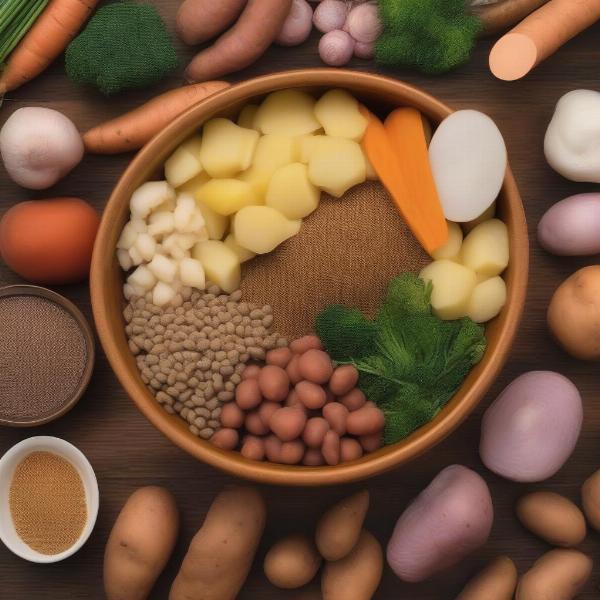Grain free potato free dog food is becoming increasingly popular among dog owners seeking alternative dietary options for their furry friends. This type of dog food excludes both grains and potatoes, focusing on novel protein sources and other carbohydrate alternatives. This guide delves into the benefits, potential drawbacks, and things to consider when choosing a grain and potato-free diet for your dog.
Why Choose Grain and Potato-Free Dog Food?
Many dog owners opt for grain and potato-free dog food due to allergies or sensitivities. Grains and potatoes, while common ingredients in many commercial dog foods, can be problematic for some dogs, leading to digestive issues, skin problems, and other health concerns. Grain and potato-free formulas often utilize alternative carbohydrates like sweet potatoes, chickpeas, or lentils, and focus on novel protein sources such as venison, duck, or kangaroo. This can be beneficial for dogs with specific dietary restrictions or those who simply thrive on a different carbohydrate source.
 Grain-Free Potato-Free Dog Food Ingredients
Grain-Free Potato-Free Dog Food Ingredients
Benefits of a Grain and Potato-Free Diet
Switching to a grain and potato-free dog food can offer several advantages for dogs with sensitivities. These benefits may include improved digestion, reduced itching and scratching, healthier skin and coat, and increased energy levels. By eliminating potential allergens, these specialized diets can help alleviate symptoms and improve overall well-being.
“For dogs with sensitivities, removing both grains and potatoes can be transformative,” says Dr. Emily Carter, DVM. “I’ve seen remarkable improvements in skin and coat health, as well as digestive function, after switching to this type of diet.”
Potential Drawbacks and Considerations
While grain and potato-free dog food can be beneficial for some dogs, it’s important to be aware of potential drawbacks. These diets can be more expensive than traditional dog foods. It’s also crucial to ensure the chosen food is nutritionally complete and balanced, as some grain-free formulas may lack essential nutrients.
How to Choose the Right Grain and Potato-Free Dog Food
Choosing the right grain and potato-free dog food requires careful consideration. Look for formulas that use high-quality ingredients and are specifically formulated to meet the nutritional needs of your dog’s breed and life stage. Consulting with a veterinarian is always recommended, especially if your dog has existing health issues. They can help determine the best dietary approach for your individual pet.
Is Grain and Potato-Free Right for Your Dog?
Deciding whether to switch to a grain and potato-free diet depends on your individual dog’s needs. If your dog exhibits signs of food allergies or sensitivities, such as digestive upset, skin problems, or ear infections, a grain and potato-free diet might be worth exploring. However, if your dog is thriving on their current diet, there’s no need to switch.
“It’s important to remember that not all dogs require a grain and potato-free diet,” explains Dr. Sarah Miller, DVM. “A proper diagnosis is key to determining if this dietary approach is necessary for your dog.”
Conclusion
Grain free potato free dog food can be a beneficial option for dogs with allergies or sensitivities. By eliminating potential allergens like grains and potatoes, these specialized diets can improve digestion, skin health, and overall well-being. However, careful selection and consultation with a veterinarian are crucial to ensure the chosen food meets your dog’s individual nutritional needs.
FAQ
-
What are some common protein sources in grain and potato-free dog food? Common protein sources include fish (salmon, whitefish), poultry (chicken, turkey, duck), and novel proteins like venison, kangaroo, or bison.
-
Are sweet potatoes okay for dogs with allergies? While potatoes are a common allergen, sweet potatoes are often well-tolerated and used as a carbohydrate source in grain and potato-free dog foods.
-
Can puppies eat grain and potato-free dog food? Yes, there are grain and potato-free formulas specifically designed for puppies.
-
Is grain and potato-free dog food more expensive? Generally, yes, due to the specialized ingredients and formulation.
-
How can I tell if my dog has a food allergy? Common signs include itching, skin irritation, digestive upset, and ear infections. Consult with your vet for proper diagnosis.
-
What are some alternative carbohydrate sources in grain and potato-free dog food? Alternatives include sweet potatoes, chickpeas, lentils, and tapioca.
-
Do I need to consult a vet before switching my dog to a grain and potato-free diet? It is always recommended to consult with a vet, especially if your dog has any existing health conditions.
Related Articles
- grain free salmon and sweet potato dog food
- what is the best dog food for huskies
- step up to naturals dog food reviews
- best dry dog food for sensitive stomach uk
ILM Dog is your trusted resource for expert advice on dog breeds, health, training, nutrition, grooming, and much more. We offer comprehensive guides and practical tips to help dog owners worldwide provide the best possible care for their canine companions. Whether you’re a seasoned dog owner or just starting out, ILM Dog is dedicated to providing you with the information you need. For any questions or further assistance, feel free to reach out to us via email at [email protected] or call us at +44 20-3965-8624.